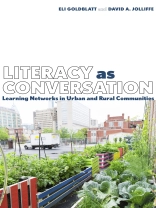In <i>Literacy as Conversation</i>, the authors tell stories of successful literacy learning outside of schools and inside communities, both within urban neighborhoods of Philadelphia and rural and semi-rural towns of Arkansas. They define literacy not as a basic skill but as a rich, broadly interactive human behavior: the ability to engage in a conversation carried on, framed by, or enriched through written symbols. Eli Goldblatt takes us to after-school literacy programs, community arts centers, and urban farms in the city of Philadelphia, while David Jolliffe explores learning in a Latinx youth theater troupe, a performance based on the words of men on death row, and long-term cooperation with a rural health care provider in Arkansas. As different as urban and rural settings can be—and as beset as they both are with the challenges of historical racism and economic discrimination—the authors see much to encourage both geographical communities to fight for positive change.
Circa l’autore
<b>Eli Goldblatt (Author) </b><br> <b>Eli Goldblatt </b>is Professor Emeritus of English at Temple University and former director of New City Writing, an institute focused on community-related literacy projects in North Philadelphia.<br><br><b>David A. Jolliffe (Author) </b><br> <b>David Jolliffe </b>is Professor Emeritus of English at the University of Arkansas, where he was the initial occupant of the Brown Chair in English Literacy.<b> </b><br><br>












